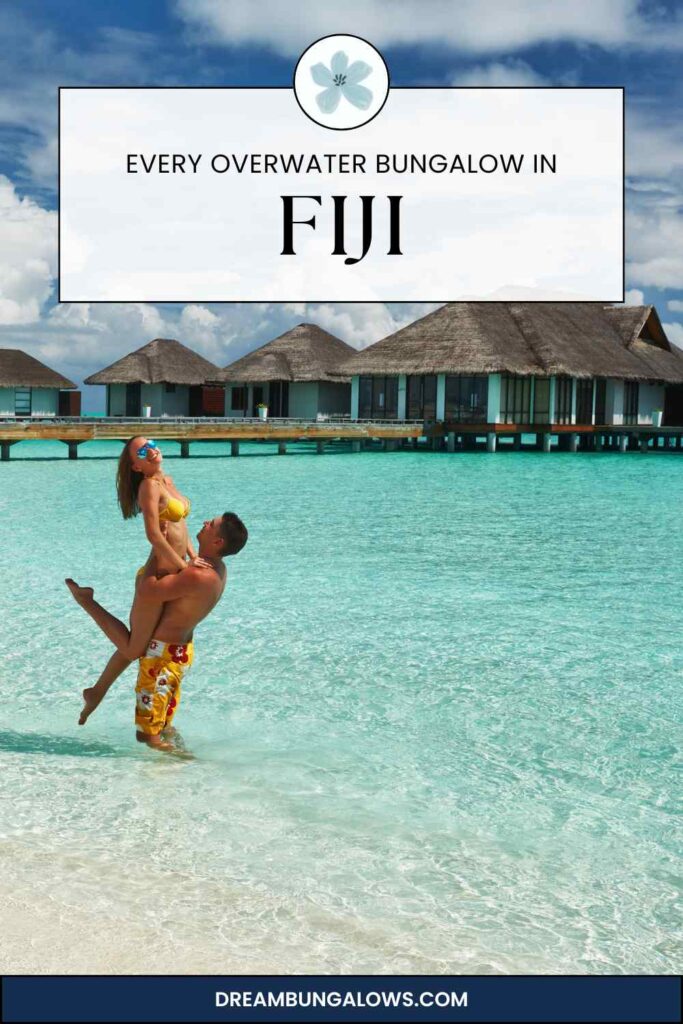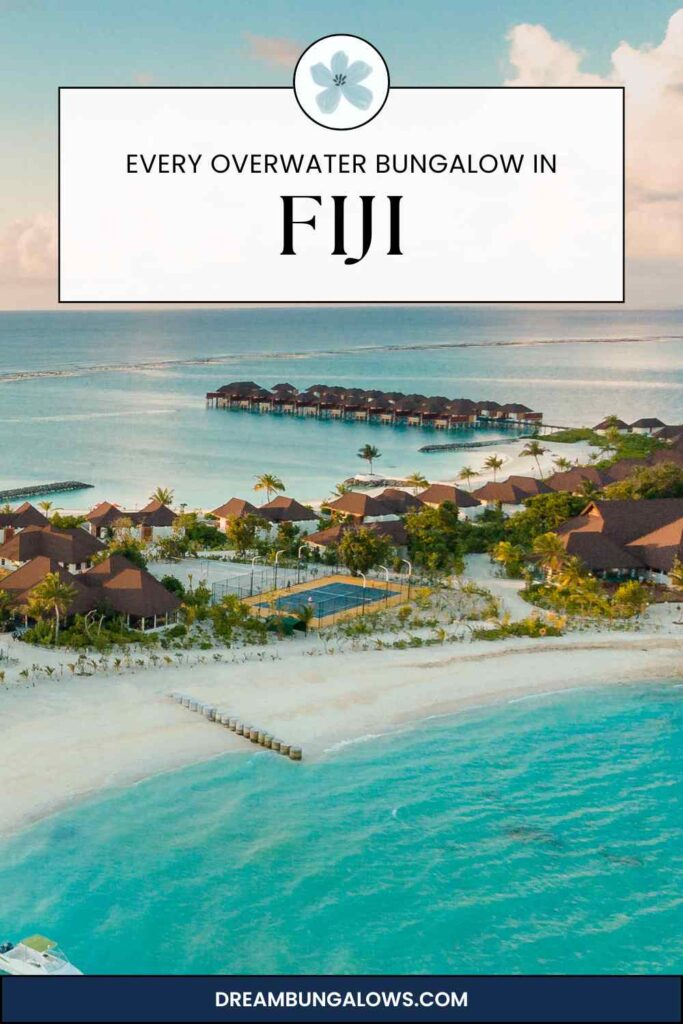Grab a tropical drink, settle into your comfiest chair, and let’s daydream together about waking up to the sound of gentle waves lapping beneath your bed.
Overwater bungalows are the epitome of vacation bliss, and while places like the Maldives and Bora Bora often get the spotlight, Fiji offers equally magical experiences.
Why Stay in a Fijian Overwater Bungalow?
Fiji is famous for its hospitable people, lush green landscapes, and coral reefs bursting with color.
But it’s also one of those bucket-list destinations for honeymooners, solo adventurers, and families alike who crave the tranquility of an island paradise.
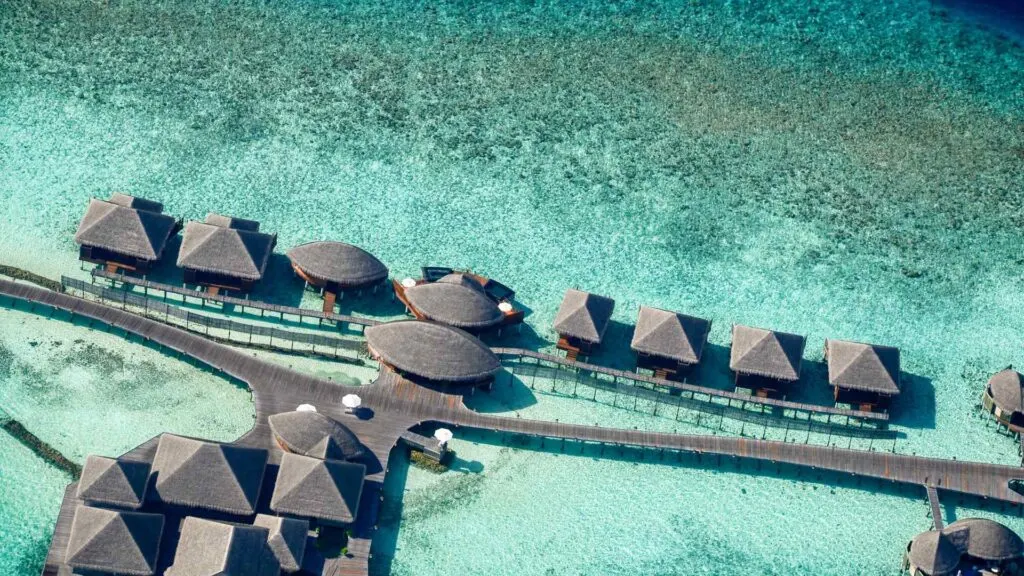
Overwater bungalows in Fiji offer:
- Direct Ocean Access
Wake up, splash in the lagoon, rinse, and repeat. It’s that simple. - Stunning Views
From your deck or through glass floor panels, watch tropical fish meander by as the sun illuminates the reef below. - Privacy and Romance
Whether you’re celebrating love or just want solitude, an overwater bure (Fijian for “house” or “hut”) gives you an intimate escape. - Immersive Fijian Culture
Many resorts incorporate local craftsmanship in their design, and staff are often from nearby villages, eager to share their traditions.
Plus, with fewer true overwater bungalow resorts in Fiji than in other locales (like the Maldives), you’ll often feel like you’ve stumbled upon a hidden gem.
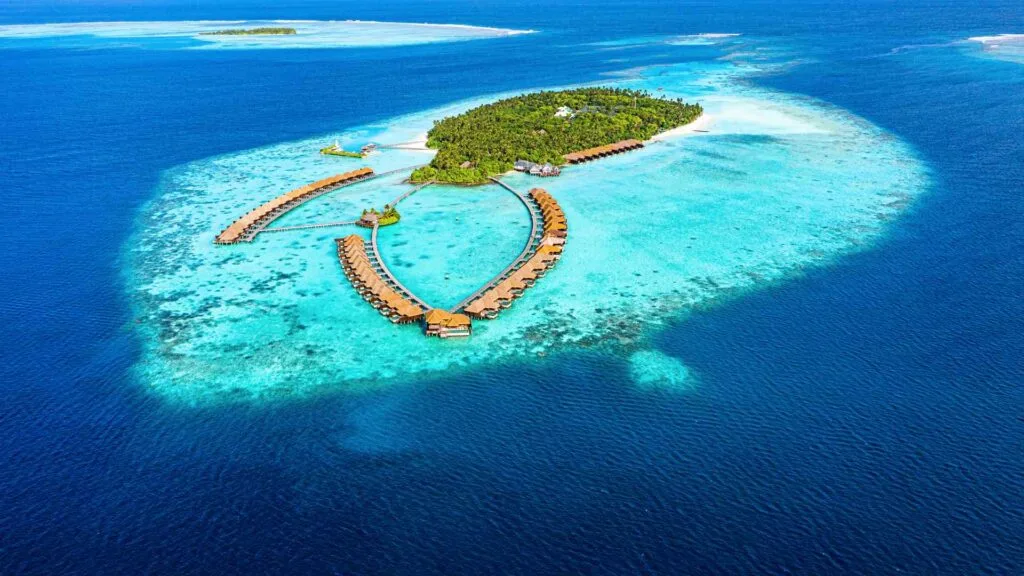
All the Overwater Bungalows in Fiji
Contrary to popular belief, you have a handful of options for overwater stays in Fiji.
They differ in price, style, and location, but each offers that signature “Fijian vibe” we all crave.
Likuliku Lagoon Resort
Estimated Price Range: $1,100–$1,500 per night
Let’s start with the one that often appears on postcards and daydreams everywhere: Likuliku Lagoon Resort on Malolo Island in the Mamanuca archipelago.
This adults-only resort is widely celebrated as Fiji’s first true overwater bungalow getaway. Each thatched-roof bure is designed using local materials—think woven bamboo, polished timbers, and handwoven pandanus leaf roofing.
Key Features
- Overwater Deck & Lagoon Access: Each bure is perched above crystal-clear water with steps leading right into the lagoon. Perfect for spontaneous snorkeling sessions.
- Glass Panels: Some floors have sections of glass so you can watch fish drift below.
- Authentic Fijian Design: Every detail, from the wood-carved doors to the local artwork, reflects the island’s rich heritage.
- Adults-Only Atmosphere: No kids allowed means extra peace and quiet, ideal for couples seeking romance.
- Local Culinary Delights: Expect fresh seafood, tropical produce, and a rotating menu that showcases Fijian flavors.
When you’re not floating in the lagoon, make time for the Tatadra Spa, which uses indigenous ingredients—like fragrant coconut oil—to rejuvenate your body and soul.
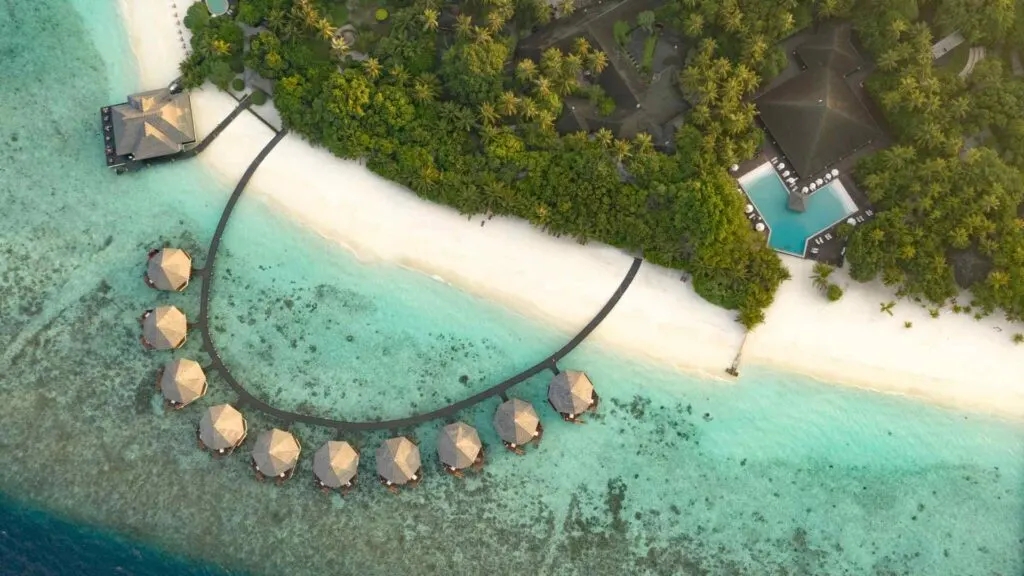
Koro Sun Resort & Rainforest Spa
Estimated Price Range: $600–$800 per night
Next up, we head to Vanua Levu, Fiji’s second-largest island, where you’ll find Koro Sun Resort & Rainforest Spa.
It’s tucked amid lush greenery, dotted with coconut plantations, and home to “Edgewater Bures” that extend over a tranquil lagoon.
Key Features
- Edgewater Bures: While slightly different from the classic “Maldives-style” overwater bungalow, they still sit right above the water with direct lagoon access.
- Rainforest Spa: Surrounded by dense tropical foliage, offering treatments inspired by local plants and traditions.
- Complimentary Kayaks & Gear: Explore the lagoon at your own pace—paddle around or snorkel to spot vibrant corals and fish.
- Family-Friendly Option: Unlike many adults-only properties, Koro Sun welcomes kids, making it a fun pick for adventurous families.
- Off-the-Beaten-Path: Vanua Levu is quieter than the main island of Viti Levu, so you’ll get a more secluded, laid-back vibe.
If you’re craving a balance of oceanfront leisure and jungle exploration, Koro Sun’s unique blend of lagoon living and rainforest immersion ticks all the boxes.
Fiji Marriott Resort Momi Bay
Estimated Price Range: $500–$900 per night
For travelers who prefer a familiar international brand, Fiji Marriott Resort Momi Bay offers a blend of contemporary luxury and Fijian charm.
Located on the western coast of Viti Levu, it features overwater bungalows that manage to be both stylish and down-to-earth—perfect for couples or families seeking a signature Marriott experience in the tropics.
Key Features
- Modern Design: Polished hardwood floors, plush bedding, and neutral tones accented by bright pops of island color.
- Glass Floor Panels: Peek at schools of fish without even leaving your living room.
- Private Deck: Ideal for sunbathing, stargazing, or enjoying room service alfresco.
- Lagoon-Style Pools: Beyond your overwater haven, the resort also has a sprawling pool complex for a change of scenery.
- Multiple Dining Options: Savor everything from international buffets to poolside cocktails, with some nights featuring live cultural performances.
Guests love the super-friendly staff, who often greet you with a warm “Bula!” and a genuine Fijian smile.
Between the swim-up bar, beach activities, and watersports, you’ll find plenty to keep you entertained if you ever decide to leave your bungalow.
Laucala Island Resort
Estimated Price Range: $4,500+ per night
If you’re looking for ultra-exclusive and have a budget that leans toward lavish, Laucala Island Resort might be your dream come true.
Once owned by the founder of Red Bull, this private island is synonymous with opulence.
While many of its jaw-dropping villas are land-based, there are overwater residences that offer a next-level escape—think personal staff, private pools, and uninterrupted ocean views in every direction.
Key Features
- Extreme Exclusivity: With just 25 villas (including a limited number that extend over the water), you’ll feel like you have the whole island to yourself.
- All-Inclusive Paradise: Gourmet dining (often featuring island-grown produce), top-shelf drinks, and activities—like horseback riding on the beach—are part of the package.
- Personal Staff: A dedicated nanny, chauffeur, and butler can be arranged to make your stay effortlessly luxurious.
- Golf & Spa: Tee off at the private 18-hole golf course designed by David McLay Kidd or unwind at the spa with therapies featuring local botanicals.
- Marine Life & Reefs: Superb snorkeling and diving right off your doorstep, with pristine reefs teeming with colorful fish.
Laucala’s price tag is undeniably steep, but for those seeking a once-in-a-lifetime splurge or a dream honeymoon with total seclusion, it’s hard to beat this private island fantasy.
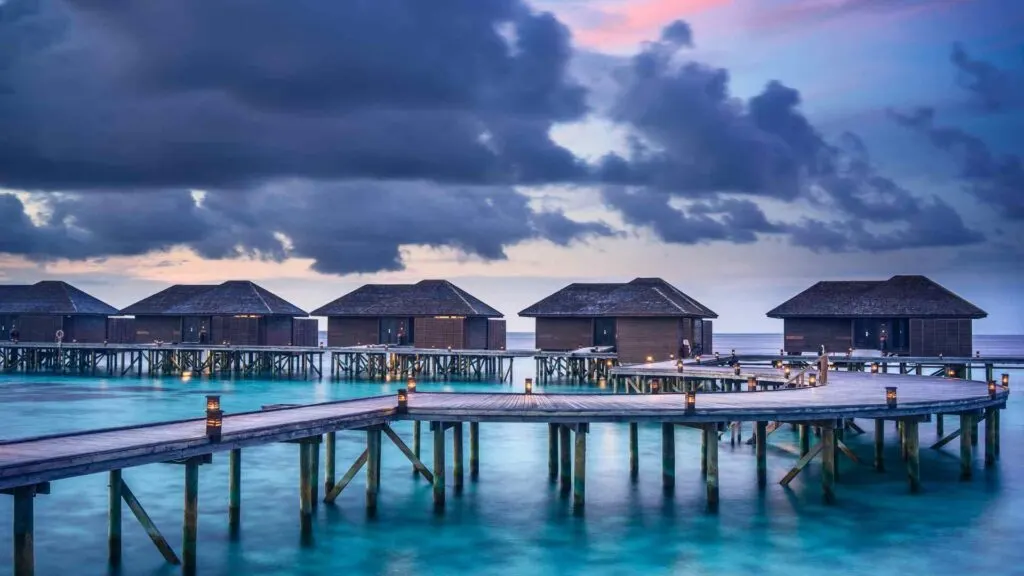
What to Expect in Your Overwater Bure
Now that we’ve identified Fiji’s top overwater spots, let’s talk about what the actual experience is like.
Each resort has its unique style, but there are a few common threads:
- Thatched Roofs & Tropical Decor
Fijian architecture often incorporates natural materials like local hardwood and woven pandanus leaves, which create a rustic-chic aesthetic. - Private Deck & Direct Lagoon Access
Most overwater bungalows feature stairs or ladders leading straight into the ocean—or lagoon, depending on the resort’s setup. - Glass Floor Panels
A common feature that adds a wow factor, letting you observe marine life without even stepping outside. - Outdoor Shower or Tub
Many Fijian overwater bures include partially outdoor bathrooms so you can bathe under the stars. - Indoor-Outdoor Living
Large sliding doors, spacious verandas, and open-air lounges connect you to nature 24/7.
Some resorts offer extras like private plunge pools, daybeds, or hammocks suspended over the water. Double-check the amenities if you have your heart set on certain luxe features.
Fiji Travel Basics
Before booking that perfect bure, it’s good to understand a bit about Fiji’s geography and culture.
- Main Islands:
- Viti Levu (where the capital, Suva, and the international airport at Nadi are located)
- Vanua Levu (quieter, more rural, and home to Koro Sun Resort)
- Language: English is widely spoken, though the national language is Fijian, and Hindi is also common.
- Currency: The Fijian Dollar (FJD). Most resorts and tourist-friendly areas accept credit cards, but having some cash on hand is always helpful.
- Culture: Strong communal values and warm hospitality define Fijian society. Respect for elders, friendly greetings, and sharing food are integral parts of daily life.
Getting Around
- Domestic Flights: Small planes connect Nadi or Suva to outer islands.
- Boat Transfers: Many resorts in the Mamanucas or Yasawas provide speedboat or catamaran transfers.
- Helicopter/Seaplane: For a special splurge (or if your resort is extra-remote like Laucala), you can charter a private transfer with stunning aerial views.
Booking Tips & Price Ranges
Fiji’s overwater bungalows can range widely in price—anywhere from around $500 a night at certain times of the year (like off-peak seasons at the Fiji Marriott Resort Momi Bay) up to $4,500+ for ultra-luxe experiences like Laucala Island.
Here’s what to keep in mind:
- High vs. Low Season
- High Season: June to September (cooler, drier months), plus Christmas/New Year’s. Expect higher rates and more crowds.
- Low Season: November to March, though these months can be rainy or humid. However, you’ll often find better deals and fewer tourists.
- Packages & Special Deals
- Look for honeymoon packages or early-bird promotions. Some resorts include meals, airport transfers, or spa credits.
- All-Inclusive vs. Room-Only
- Overwater bungalows can be part of an all-inclusive plan (like at Laucala or certain special offers at smaller resorts), which might actually save you money if you plan to indulge in a lot of food and activities.
- Resort Reputation
- Read reviews (and check out photos from past guests). Sometimes a lower price can still mean a quality experience, especially if you appreciate a more local, rustic vibe.
If you’re on a budget, keep an eye on Koro Sun or look for special deals at the Fiji Marriott. For a mid- to high-range honeymoon, Likuliku is the iconic choice. And if money is no object, Laucala Island awaits with open arms.
Best Time to Visit Fiji
Fiji’s tropical climate means it’s warm year-round, but weather patterns can affect your stay. Let’s break it down:
- April to October: The drier, milder season with average temperatures around 75°F–85°F (24°C–29°C). Popular with tourists, especially in July and August.
- November to March: The wet or “green” season, which brings higher humidity, occasional downpours, and potential cyclones (though they’re not super common). Temperatures can reach up to 90°F (32°C).
Why Visit During the Wet Season?
Rates can be lower, the islands are beautifully lush, and you’ll often have more space to yourself at popular resorts.
Just remember to pack a light rain jacket and keep an eye on the forecast in case of storms.
Must-Do Activities & Excursions
Sure, lounging on your bungalow’s deck is a vacation in itself. But if you feel like exploring:
Snorkeling & Diving
- Coral Reefs: Fiji is nicknamed the “Soft Coral Capital of the World,” so expect brilliant displays of corals and marine life.
- Shark Dives: Some operators near Pacific Harbour offer thrilling (and safe) shark-feeding dives for the adventurous.
- House Reefs: Many overwater resorts have vibrant coral gardens just steps from your bure ladder.
Island-Hopping
- Day Cruises: Hop on a boat tour to explore uninhabited islands or local villages.
- Picnics on Sandbars: Some resorts organize private lunches on tiny sandbars for that castaway vibe.
Cultural Experiences
- Kava Ceremonies: A communal ritual where you drink a mildly sedative beverage made from the kava root.
- Meke Performances: Traditional dance performances accompanied by drumming and chanting—an enthralling glimpse into Fijian heritage.
Spa Treatments
- Coconut Body Scrubs: Hydrate and exfoliate with locally sourced coconut oil.
- Hot Stone Massage: Drift off while Fijian volcanic stones ease tension.
Adventure & Sports
- Surfing: The Mamanucas are near famous breaks like Cloudbreak.
- Hiking: Waterfalls, volcanic mountains, and rainforest trails abound.
- Zip-Lining: Try it near Pacific Harbour or on select islands.
Fijian Culture & Cuisine
One of the biggest perks of staying in Fiji is getting a taste of the local way of life—literally.
Friendly Locals
Fijians are known for their warmth and inclusivity. Don’t be surprised if staff learn your name on day one or invite you to join in a song during a communal dinner.
Must-Try Dishes
- Kokoda: A ceviche-like dish of fresh fish marinated in coconut cream, onions, and lime.
- Lovo Feast: Food (meat, fish, root crops) cooked in an underground oven, giving it a smoky, melt-in-your-mouth flavor.
- Taro & Cassava: Starchy sides often served with meals, accompanied by fresh veggies and coconut-based sauces.
Cultural Etiquette
- Dress Modestly in Villages: Cover your shoulders and knees if you visit a local community.
- Bring a Gift: Kava root or a small donation to the village fund is a nice gesture.
- Say “Bula!”: It’s not just hello; it’s an entire vibe of well-wishing and friendliness.
Frequently Asked Questions (FAQs)
Q1: Are there really only a few overwater bungalow resorts in Fiji?
Yes. Unlike some destinations that have dozens, Fiji’s overwater options are more exclusive, which also makes them extra special.
Q2: Do all overwater bungalows allow children?
Not necessarily. Likuliku is adults-only, while Koro Sun welcomes families. Fiji Marriott is also family-friendly. If you’re traveling with kids, confirm the resort’s policy in advance.
Q3: Is there a risk of tropical storms or cyclones?
Fiji’s cyclone season generally runs from November to April. While storms aren’t guaranteed, travel insurance is always a good idea.
Q4: Will I need a visa to enter Fiji?
Visitors from many countries (including the U.S., Canada, EU nations, Australia, and New Zealand) receive a tourist visa on arrival for stays up to four months. Double-check your country’s requirements before traveling.
Q5: How do I get from the airport to my overwater bungalow?
Transfers vary by resort. Some offer speedboat pickups from a nearby marina; others use small planes or helicopters. Check with the hotel for specific details (and associated costs).
Q6: What should I pack for an overwater bungalow stay in Fiji?
Pack lightweight, breathable clothing, reef-safe sunscreen, insect repellent, a hat, sunglasses, and maybe a light sweater for cooler evenings. And, of course, your swimsuit—lots of them!
Final Thoughts
Staying in an overwater bungalow in Fiji is a bucket-list experience for good reason.
There’s something about being surrounded by the ocean’s gentle lullaby while immersing yourself in the Bula spirit that recharges you on a soul-deep level.
Whether you’re seeking a romantic hideaway, a family-friendly lagoon escape, or an otherworldly, lavish retreat, Fiji’s unique overwater options have you covered.
- Likuliku Lagoon Resort offers that quintessential adults-only overwater fantasy with authentic Fijian touches.
- Koro Sun Resort & Rainforest Spa blends lagoon living with lush rainforest vibes—great for explorers and families.
- Fiji Marriott Resort Momi Bay provides a modern, globally recognized brand’s take on overwater luxury, complete with top-notch facilities.
- Laucala Island Resort caters to those craving absolute seclusion and have no problem sparing any expense.
Whichever you choose, remember to breathe in the ocean air, embrace the warm Bula welcome, and let Fiji’s rhythms guide you to a deeper appreciation of life in the slow lane.
